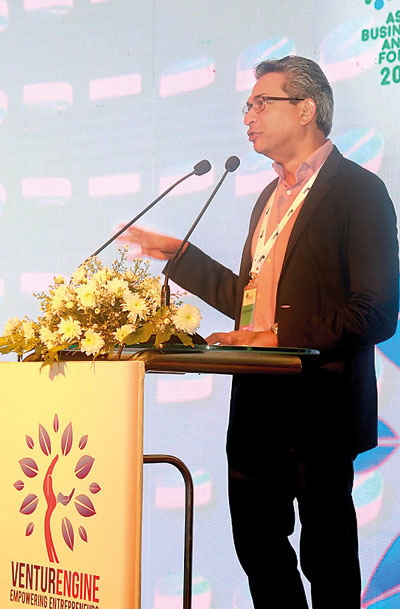SL should foster entrepreneurship to fillip start-ups
View(s):Participants at the Asian Business Angels Forum on Wednesday were highly taken up with the local start-ups that were featured and agreed that Sri Lanka’s talent for entrepreneurship is incredible.

Google India M.D Rajan Anandan
One of the broad criticisms by local participants was Sri Lanka’s schooling system is failing to prepare pupils for meaningful participation in the economy.
Entrepreneurship needs to be a part of the secondary school curriculum and should be taught widely and effectively, they said.
Take for an example Imal Kalutotage owner of Ncinga (P) Ltd, a company that helps build smart factories to enable factory owners/ managers to take data driven decisions using real time operational insights, who started his entrepreneurial journey through this company at 40. He had scored 4 ‘A’ passes of the crucial advanced levels, selected to the Moratuwa Campus for electronics and Telecom Engineering worked at many large multinationals here and abroad and cottoned onto this company.
He says that had the educational and the social system appreciated entrepreneurship, there will be many who’ll build firms and create jobs. “The school curriculum should teach entrepreneurship early,” he told the Business Times on the sidelines of this forum.
He said that many miss the opportunity as there is evidence that if entrepreneurship training were offered effectively at schools, school leavers would be far better prepared for the transition into the labour market. “They would also feel more confident about identifying business opportunities and starting their own companies.
The education system therefore needs to equip young people with skills and knowledge that will allow them to be flexible, adapt to new demands and take advantage of the opportunities that will arise for disruption across all kinds of industries.”
That means preparing them to think critically, solve problems and take advantage of new technologies agreed Google India Managing Director, Lankan-born Rajan Anandan. It means greater use of information and communication technologies as teaching tools and as a central part of the curriculum, he said. “The government should expand the IT, sector,” he said adding that human capital is Sri Lanka’s best asset.
Tony Weerasinghe, the founder of Millennium IT stressed on granting the employees freedom to be innovative. Mr. Kalutotage added that most important, it means encouraging entrepreneurial thinking that sees the challenges facing society and the economy and the opportunities that exist in solving them.
Many participants rated education and training as one of the three most significant factors constraining entrepreneurship in South Asia.
Sri Lanka should stop glamorising the Silicon Valley and start looking within to find solutions, one participant said noting that only then will genuine innovation evolve. “There is much we could learn and gain from places like Sri Lanka and India”.
Noted Mr. Anandan; “Countries like Sri Lanka and India have what it takes to be uniquely brilliant and entrepreneurial.”


